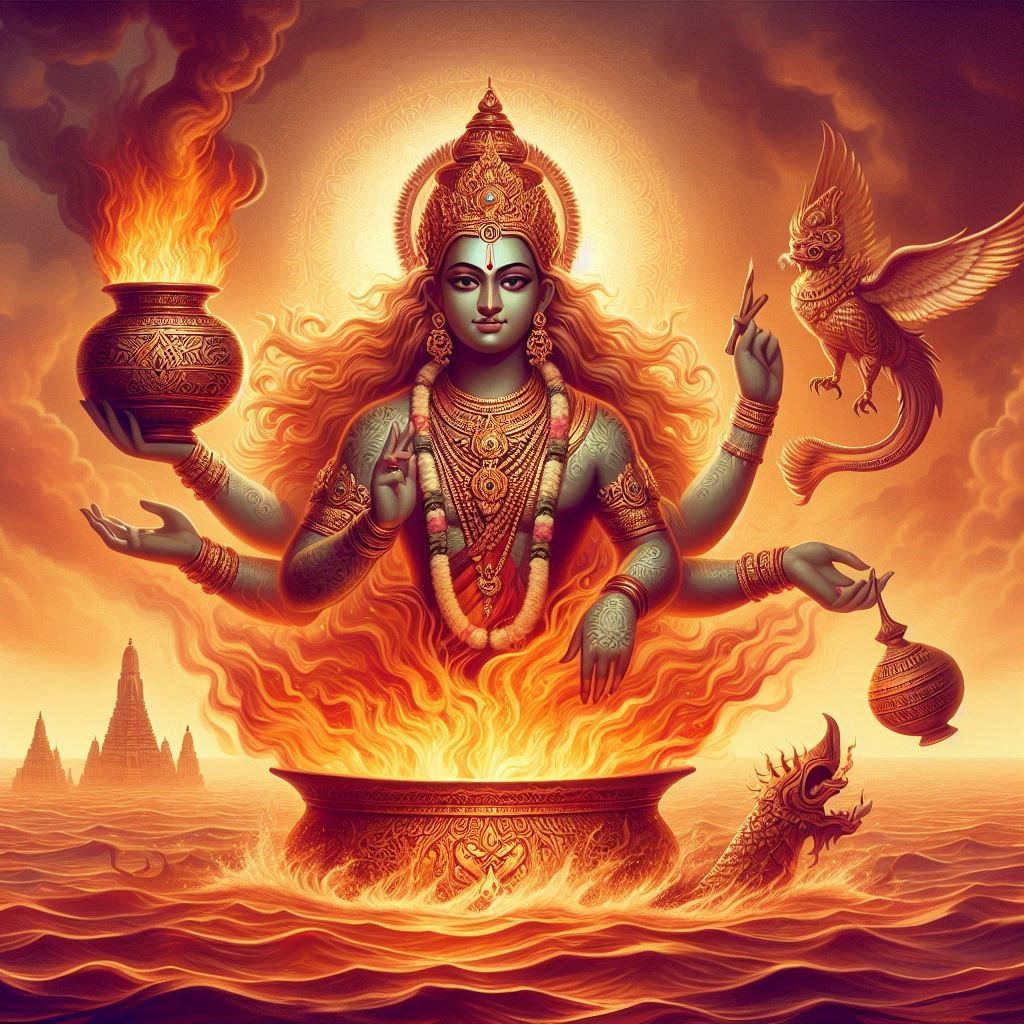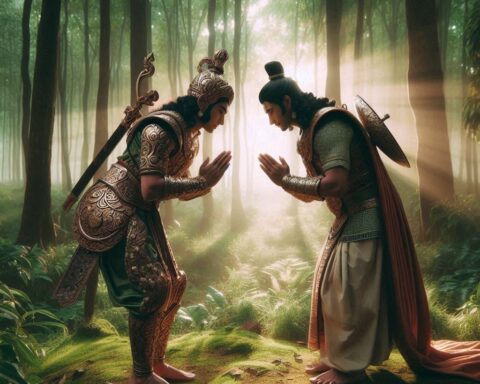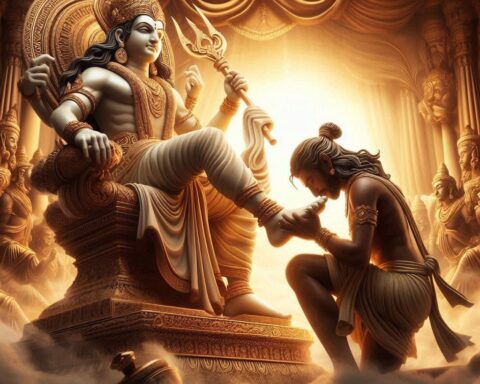It was the same nightmare that awoke Kausalya in a fit of panic every night. She hears frantic knocking and banging on the door and the heart-wrenching pleas of a little girl calling out to her, “Mother! Mother! Open the door. I’m afraid.”
Kausalya is unable to move because her hands are tied. She is trapped in a closed box and is trying hard to wriggle out of the tight knot on her wrists. She wants to open the door, to console the little girl, to tell her to wait, and that everything will be alright soon. But no voice comes out of her throat. She can feel herself screaming silently.
The nightmare continues. The little girl has grown into a beautiful woman. She is a great warrior, adept at wielding the most dangerous and powerful weapons with ease. And yet, she stands outside the closed door pleading with her mother, “Why are you not opening the door? Why can’t I come in? Why are you sending me away?”
Again, Kausalya tries hard to speak. She wants to tell the girl to come in. But she knows her voice has no power and it will not reach her daughter’s ears. Kausalya sheds copious tears mixed with helpless rage as she hears her daughter walk away from the door, “Alright mother. I won’t disturb you anymore. As commanded by my father, I will go elsewhere and make a life. Don’t worry about me. I hope you will always be happy.” At this point, Kausalya wakes up in a panic, her face and pillow wet with tears.
She recalls the day when she was a mute spectator to her husband King Dasaratha’s decision to give away their eldest and their only child at that time in adoption to King Lomapada. Her husband had said, “Shantha will be more useful to King Lomapada than to me.”
That’s it. There was nothing more to argue. A woman’s usefulness was paramount. Her desires and needs were nothing. Kausalya watched and participated in the adoption rituals with impotent dismay. She didn’t say a word in protest. How can she challenge her husband’s decision?
Surprisingly, Kaikeyi, the second queen of King Dasaratha, and whom Kausalya considered her rival, tried to intervene. She challenged her husband bravely. “Shantha is our eldest child and she has all the qualities to be the ruler of Ayodhya. Why are you giving her away like a commodity?”
Dasaratha’s face reflected guilt-tinged anger. He hid his guilt behind scriptures saying, “How can a daughter sit on the throne of her father’s kingdom? I need a male heir. King Lomapada needs Shantha to help him end the drought in his kingdom. Our sacrifice will give us the boon of a male heir.”
The adoption rituals were done and Shantha left her birth home, Ayodhya, to be of ‘better use’ to her adopted home, Anga. Kausalya could never forget Shantha’s last look before she got into the palanquin. Her eyes seemed to say, “Don’t worry, mother. I know I’m not wanted here. May you be blessed with a son, as you wish.”
Kausalya believed that Ayodhya would not get a male heir until Shantha laid her blessed feet on the kingdom again. Her belief was vindicated when Rishi Rishyashringa agreed to perform the Putrakameshti yagna, the sacrificial ritual to beget male children for King Dasaratha. This wise and saintly man’s wife was none other than Shantha, the eldest-born of the current generation of the Suryavanshi clan.
Kausalya, Kaikeyi, and Sumitra (King Dasaratha’s third wife) were stupefied when they saw the august entrance made by Rishi Rishyashringa and his noble wife. Shantha’s calm and composed countenance had a blessings-filled smile for her mothers.
Now that she was the Guru-Patni, they were no longer her parents but her supplicants. Her father King Dasaratha kept his head bowed down and could never lift them to meet his daughter’s eyes. Shantha partnered with her husband to perform the powerful Putrakameshti yagna which would give her parents male heirs for the throne of Ayodhya.
At the end of the successful yagna, a divine being appeared holding a potful of potent payasam. He gave the pot to Dasaratha and said, “Share this payasam blessed by the gods among your three wives. They will bear you sons.” The divine being then bowed respectfully to Rishi Rishyashringa and Guru-Patni Shantha and disappeared.
At night when Kausalya was alone with her husband, she asked him, “You knew it, didn’t you?”
Avoiding eye contact with his wife, Dasaratha asked, “Knew what?”
“That she was needed to get Rishi Rishyasringa into the grihastha ashram because he was one of the very few men who could perform the Putrakameshti yagna! You sacrificed our firstborn so that you could get a son!” She couldn’t keep the grief-laden cry of lament out of her voice.
Her husband replied gruffly, “I told you she was needed by King Lomapada first. The Rishi had to come out of seclusion and marry someone as chaste as Shantha so that King Lomapada could harness the power of the rishi’s penance to appease the rain gods and end the horrendous drought in his kingdom. Is it wrong to use the strength of goodness to do more good to people?”
“Of course, when the good act for King Lomapada was done, the Rishi could then turn his attention for our good, isn’t it? You planned it all along! And my unquestioning devotion to you blinded me to my daughter’s bond! Or was I too scared to lose the good name of being a “chaste wife” to fight for my daughter?”
She looked at her husband as tears of guilt and self-loathing streamed down her face. King Dasaratha left her chambers telling her, “You will realize the value of my action at the appropriate time; when you deliver a son whose name and reputation will reverberate for eons on this sacred land!”
As promised by the divine being, after consuming the blessed offering that emerged from the sacrificial fire conducted by Rishi Rishyashringa, King Dasaratha’s three wives delivered four sons.
Kausalya’s son was Rama, the man who would go on to become Lord Rama, a Maryada Purushottam, an unparalleled epitome of an ideal man and king, teaching us how to rise above human limitations and attain divinehood.
Kaikeyi gave birth to Bharatha, a son who wouldn’t hesitate to forsake his mother to stand by his principles.
Sumitra had the twins, Lakshman and Shatrughna. Lakshman would go on to become the universal symbol of brotherly love and sibling commitment.
King Dasaratha was beyond happy with his fate and how it was aligned with his dreams. Yet, a nagging doubt (the seed of which was sowed by Rishi Rishyasringa just before his departure after the successful completion of the Putrakameshti yagna) never left King Dasaratha in peace for the rest of his life.
Rishi Rishyashringa’s parting words to Dasaratha were, “You will undoubtedly have male heirs as you wish. But when the time comes, only the most deserving of your children, the one who yearns for your love will be there for you, and no one else.”
And thus goes the story of the birth of Lord Rama, who became far more than a son to King Dasaratha, a man who became a god for living an ideal life by upholding nearly all virtues of mankind; a man who was, is, and will be worshipped by believers all over the world, a man who is revered as an incarnate of Lord Vishnu who came down to earth to instil the importance of leading a virtuous life to human beings, regardless of the obstacles thrown in our paths.
Four radiant, illustrious sons were born in Ayodhya, thanks to the unconditional parental devotion and love of one daughter.
This blog post is part of the blog challenge ‘Blogaberry Dazzle’
hosted by Cindy D’Silva and Noor Anand Chawla
in collaboration with Dr. Preeti Chauhan.
Featured Image created using MS Co-pilot







This is class, Ratty! Simply awesome and informative!
Thank you!
Life is a paradox, we always aim for our own interests and conditioned mindsets. I wasn’t aware of this story, and from where originates the gender bias.
Gender bias did not originate here. It was always there. Men did this and women did that. I don’t think women were disrespected during those times as much as they were not given opportunities to rule the kingdom. Kaikeyi was a classic example wherein Dasharatha often sought her advice on political matters. However, the kingdom always focused on a male heir. But yes, such thoughts gave way to cruel gender biases later on. IMHO
If you want to learn politics, you must read the Ramayan and the Mahabharat😛. Seriously, in the name of fate, destiny or whatever it was, such games were played. I have read about Shanta’s sacrifice but it was really nice to read the story in your words Ratna. I enjoyed it very much… as usual🙂.
Yeah, yeah. Politics is rife across all religions. Mahabharata is brilliantly political. Ramayana, a wee bit less, I’d say. A few episodes reek of politics, of course. Thank you for your appreciative words, Kaveri.
Thank you for sharing the story of Shanta! It is saddening to know that even Lord Rama’s father was a slave to the rituals for a male heir, sacrificing his daughter.
Oh yes! Male heir was paramount! Thank you for reading my story.
Your blog is a treasure trove. Every time I get to learn something new. I thought I know my mythology, but you have proven me wrong. I never heard the tale of Shanta. I thought patriarchy started after Manu smriti, but this shows that it is deep-rooted in our scriptures. A daughter is sacrificed to beget a male heir to the throne. In this kaliyuga daughters are looking after their parents and at least they are getting their due.
“treasure trove” makes me jump with joy, Harjeet. And yeah, Shanta’s story is not well-known but is a part of Valmiki Ramayan. She was given away to the rishi is also there. That Dasharatha sought a male heir is also there. How she was married to the rishi is my own take. Thank you for your lovely words. They motivate me to seek and write new and lesser known stories from our puranas and itihasas.
Ratna, this was a revelation to me. Thank you for this
huh! I never knew King Dashrath and Queen Kausalya had a daughter too. Just goes to show how the patriarchy goes back centuries and is etched deep even in our scriptures. Thanks for sharing this bit of the epic with us which I’m sure not many (like myself) are aware of.
Lord Rama did grow up to a wonderful son and King indeed 🙂
P.S: Btw, this story reminded me of a show I’m currently watching (House of the Dragon) a period fantasy drama, where the ruling house is warring because the world is apparently not ready to accept a queen sitting on the throne and ruling over them.
Thank you for your words, Manali. The House of Dragon is something I still have to watch. GoT I loved.
Surprising, I never knew/heard this story. Thanks for sharing.
Your stories each week serve as a religious teaching to me each week. Yet another great story. I m familiar with the gods in your story but never with their stories.
Thank you, Caroline. Am glad you’re enjoying these retellings.
I knew they had a sister but didn’t know exactly what happened to her. Feel sad for her fate but all these things happen with divine intervention, no? We’re mere spectators to their actions.
Ya, Shantha’s story is not well-known. Belief in fate and divine intervention is one way of leading our life although that should not stop us from giving our best to whatever is in store for us. That’s what Shantha chose to do here.
I never know Ram had a sister too. Your blog is very informative. Though I don’t like mythology at all, but your storytelling is gripping. Always learning something new from your blog post.👍
Thank you, Neeta. I’m happy I can keep the interest in our puranas and itihasas alive through my retellings and my own perspectives. I hope it rekindles your interest and you read more. Thank you for your praise. Am honoured.
I heard a different story of Dasharatha and his 3 queens , their journey to motherhood. But your penning story opened a new window for me to learn another story about the King and his 3 queens journey to parenthood for a male child. I am bit confused now which one to consider the best for holding in my mind. Thanks for making me think.
I did not know about the story, and it is actually sad that the Lord was born because of the pain and sacrifice of a daughter. however, i disagree that it is unconditional parental love.
Thank you, Ishieta. For me, it was parental love. She chose to do what her father wanted her to do despite being strong enough to resist it. Of course, you are right in your opinion too.
Your blog never fails to amaze me. There’s always something new to learn. It’s tragic that daughters were sacrificed for male heirs.
Thank you for liking my blog, Felicia.
This is one of my favourite parts of Ramayana. My husband’s family belongs to the land of Ram, hence these stories are deeply rooted in our lives. Beautifully narrated.
Belonging to His land is an honour, indeed. His stories should never be lost. Thank you for liking my narration.
I thought that I knew each character of Ramayana but I was wrong. I never read about Rama’s elder sister. Wonderfully narrated. Thanks for completing the Ramayana I know 🙏🏻
You’re welcome, Aditi. I’m so glad I could introduce Shanta to you. Thank you for your lovely comments.
I’m learning much about your kind of mythology from you! In my opinion, you’ve made it more entertaining to read that even someone like me who isn’t interested much on mythologies are compelled to read.
Thank you, Jeanine for reading and liking my retellings. Am honoured by your kind words.
I read about shanta earlier and now, while reading this post, I recalled again. Shanta was one of the bravest girls loved by Kaushalya , and also a reason because Kaushalya asked Ram’s prison to dashatha. Lovely read.
Thank you, Pamela. Oh yes, Shantha was easily one of the bravest and kindest souls in the Ramayana
This is the first time I have read this story. Thank you for sharing it. I didn’t know that Ram had a sister too. I always learn something new when I visit your blog.
I have read this story in Valmiki’s Women by Anand Neelakantan. It was from Shanta’s point of view. Lovely to read the full story. Always enjoy your retellings.
Thank you, Ritu. Anand Neelankantan is one of my favourite authors. He’s the one who taught me to look at things with a 360-degree view and thereby come up with lesser known perspectives.
I am always learning a new episode every time I read your post. It is hard to believe that Kaushalya had a daughter whom King Dashrath gave away to amplify his desires or needs of others only to get a male heir. But history is always an eye opener. Loved your way of narrating the story.
I had no clue about this fascinating story. Thanks for sharing it.